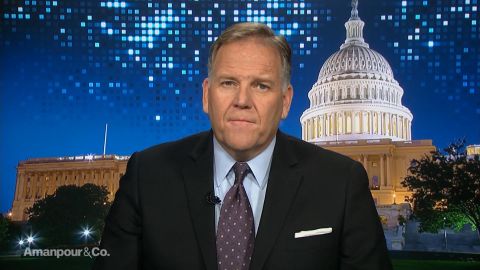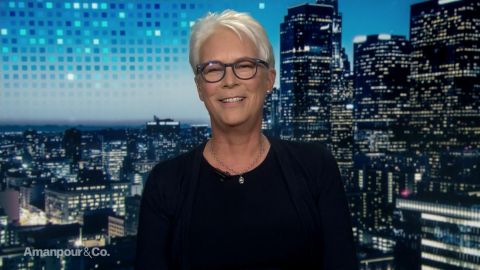Read Transcript EXPAND
AMANPOUR: And now we turn from Hollywood to Silicon Valley, where technology is stitching the fabric of today’s society, impacting everything as we know, from employment to housing costs. Enter 28-year-old Ankur Jain; he is the founder and CEO of Kairos. It’s a venture tackling social issues by investing in young entrepreneurs. And he explained to our Alicia Menendez how millennials can combat the challenges ahead.
(BEGIN VIDEOTAPE)
ALICIA MENENDEZ: Ankur, thank you so much for joining us.
ANKUR JAIN, KAIROS FOUNDER & CEO: Thanks so much for having me.
MENENDEZ: Let’s start at big picture. How would you characterize the current state of technology and tech industry?
JAIN: It’s so funny. So technology for the longest time has been this holy grail of change; it’s been this opportunistic, do no evil, incredible place to be. All of the sudden, though, tech is starting to touch people’s lives in ways that I don’t even us in tech ever expected – to the point where the I think technology companies, in many ways, are becoming more powerful than governments. One of the problems with that –
MENENDEZ: Can you give me an example of that?
JAIN: Yes, I mean if you look today, companies like Amazon have more impact on the level of employment in cities, the cost of housing in areas — I mean, if you look, Amazon just announced that they were going to open up a headquarters in Long Island City. Home prices skyrocketed. Right? And so if you’re not participating in that ecosystem, you’re suddenly being priced out because one tech company decided to move into a neighborhood. I mean, that’s a bigger impact than New York State can have with a ton of their different subsidies. Right? And you have city governments and state governments fighting and offering tax packages and government bills just to attract technology.
MENENDEZ: So it’s not even just the way you’re interacting as an individual with the technology, it’s —
JAIN: That’s right. It’s so much wider spread than that. Right? And — and you look at the impact from a product standpoint, these companies that now own our data are using it in ways that I don’t think any of us, again, expected. The challenge is that embedded in the DNA of these technology companies isn’t the same level of social responsibility that at least hypothetically a government has. Right? And so you’re starting to see this emerging distrust and backlash against these tech companies as people start to realize my health care prices are going up because of tech companies, my ability to get hired is disappearing because of tech companies. All of a sudden these tech companies are choosing winners and losers in society and that starts to open up kind of a Pandora’s box.
MENENDEZ: Explain how they do that.
JAIN: Well again, like, you look at today, these new — even algorithms that are determining hiring today. On one hand it can be used for good to help remove bias from hiring. Right? And there’s some companies that are doing that. But on the other hand, there’s now an opportunity where if you don’t have certain skill sets that the algorithm has decided qualify you for a job, you just don’t get it. And all of a sudden insurance models for things like healthcare can start to price people– this is one of the biggest fears of a lot of the new healthcare partnerships with Facebook, is what will happen when health insurance companies can more accurately price you based on your potential risk in the future. Right? And like 23 And Me is another example, like if genetic data opens up to health insurance companies, things changes. Right? So all of a sudden technology companies have this significant role in people’s lives that aren’t just kind of this separate bubble.
MENENDEZ: Is it that all of a sudden they have this significant role in people’s lives or all of a sudden we’re realizing that they have a significant role in people’s lives.
JAIN: It’s both. Right? It’s — it’s — over the last 10 years, Id’ say, tech has started to mature as an industry. Right? And as tech has matured, you started to see these giants come in. And these giants have been able to aggregate kind of distribution, data et cetera. And so again, if you look at even things like Amazon, it’s very hard, even as a non- consumer but a small business to compete in a market where Amazon has distribution. Because you just can’t compete with one-hour free delivery at scale the same way Amazon can.
MENENDEZ: Can a giant tech company reincorporate social good into its DNA?
JAIN: Well, so look, I actually — I’m a big believer in capitalism as a force for good if prioritized. Right? And so if you think about it, some of the biggest problems in the world are also the biggest market opportunities. So when people ask should companies like Amazon bake social DNA into their corporate for the sake of doing good, I think they should. Will they? Probably not. But will they do it because there’s a big market opportunity? I think yes. And so if you think about today, over 80 percent of all income today is just spent on five basic needs. Housing, child care, health care, food and transportation. Right? I don’t think it’s a coincidence that two of the five categories are where the biggest tech companies have grown in the last five years. So transportation, you look at Uber and DiDi and Lyft and food, where Amazon and these guys have made their biggest investments. Right? And so all of a sudden I think you’re going to see an opportunity for technology companies to hits these basic needs because there is a big market. But the social —
MENENDEZ: They’re addressing the needs but they’re not actually making those needs more affordable.
JAIN: Well this is where I think — so if you look at where — let’s take a step back. Right? The average consumer today, despite all the economic growth, has been left behind. And when average Americans, millenials especially, can’t afford to pay their rent, they can’t afford child care to go back to work — I mean these are serious, serious problems. And so I think what you will see is a new growth of start-ups focused on those type of areas with a focus on affordability.
MENENDEZ: Your company Kairos, tell me about some of the work that you’re doing in that sector.
JAIN: So we are one of the groups pushing more and more capital towards new technologies to help solve that. So I’ll give you an example. If you take housing, it’s the biggest expense for people across the world. Right? And yet as rent has taken up a bigger and bigger piece of people’s income, it’s actually not what’s tipped people over the edge. What’s the problem today is that if you want to rent in any city — New York, St. Louis, Miami, San Francisco — in addition to paying monthly rent, you have these massive up from costs. So security deposits, sometimes broker fees, moving fees. And when you combine that with a lack of savings, you start to see an explosion. So today, people have $45 billion of their savings tied up in security deposits. You know, when you sign a lease they make you take a month of your rent? The average millennial only has $1,500 in savings. So you’re talking about double their life savings locked away in a security deposit that you can’t touch. I mean, that’s crazy. And so, one of the companies that we’ve been building at Kairos has said, “hey, we can give that money back to people while creating a business opportunity.” So we launched an insurance company called Rhino where for just $5 a month people can now insure their landlord and keep their security deposit. And so, all of a sudden that money that was being locked away can be used to pay off debt, to put into emergency savings, et cetera.
MENENDEZ: So you’re focused on housing.
JAIN: Yes.
MENENDEZ: How about child care?
JAIN: So as people start to have families, almost 20 percent of household income is now going to childcare. So you have this weird situation where you have a growth in dual income households. So 7 in 10 new moms are going back to work. There’s this massive emergence, and yet they’re not actually making much more income because most of that new income post tax is going to childcare costs which just doesn’t make sense, right? And so, one of the things that we’re doing is we’re trying to say how do we actually change that dynamic by grouping demand? So we’ve launched a company called Kindisde in the childcare space. And like in health – in healthcare, the insurance companies pull patients sot that can buy essentially health services at discounted pricing and increase kind of quality care. We’re doing the same for childcare. So now people can sign up for a childcare membership kind of like an AARP or something of the sort, and we’re actually negotiating cheaper prices by buying childcare spots in bulk and allowing them to apply their $5,000 tax credit automatically. So you’re cutting the cost by almost 40 percent.
MENENDEZ: You’re building a for-profit organization that is focused on addressing social needs but at the same time needs to remain profitable.
JAIN: Yes, yes.
MENENDEZ: How do you truly balance those needs?
JAIN: This is why I think it’s much easier for a startup to drive change than it is for a big company because truly at the beginning of the product, tech is for – tech companies have typically started in two ways – problem first or technology first. I think part of the challenge that you’re seeing is so many of these businesses who’ve started with technology first of just what if we could do with Y technology, right? And then they try to figure out the use case and you have like what Facebook became which is a lot of unintended consequences. On the other hand, you have solving the problem first. And I think in that case it’s not a tradeoff. The question doesn’t apply. It should be that the more you solve the problem the more revenue the business makes.
MENENDEZ: Right.
JAIN: And so, it’s a true aligned incentive from the beginning.
MENENDEZ: How do you keep your eye on that north star?
JAIN: I think the bigger risk is not whether the company’s alignment remains with solving the problem. It’s can we identify the unintended consequences before it’s too late?
MENENDEZ: For example?
JAIN: So, again, if you think about, you know, at premise Amazon had set out to make things more affordable from my – like whether it’s buying books or whether it’s buying products –
MENENDEZ: From a consumer perspective.
JAIN: (ianudible) I mean, by the way, part of the reason Amazon hasn’t been broken up as a monopoly is because under the monopoly trust law, it has to show that it’s been in the negative interest of consumers where Amazon has actually made products cheaper and more accessible. And so, it’s been hard for people to make the case that it’s a monopoly in a bad sense. But the unintended consequences have been significant. And so, I think this is where it’s an actual moral responsibility of technology leaders to actually spend time thinking about these unintended consequences and saying how do they address them head on.
MENENDEZ: Do you have an intention of taking any of these companies public?
JAIN: Eventually.
MENENDEZ: And then what happens when you are beholden not to your own vision but to the vision of shareholders?
JAIN: It goes back to the same thing, right, is that our ability to drive returns for shareholders should be tied to sovling these problems, right? And I recognize that this is – there’s a lot of distrust in the tech world, right? And so, ultimately the only way to show this is by actually making that impact, right? I mean, we can sit here and talk about it all we want and there will always be some level of distrust, but I think the product has to speak for itself, right? If people are better off because of your product across, you know, again, intended and unintended, then you’re actually driving the change people want. And if they’re not, then people will continue to distrust. And by the way, they won’t purchase your product anymore. I mean, that’s part of the power of today’s consumer is they can be very vocal and they get to take their money where they believe they can trust the brands and the companies, right? And so, it’s not – it’s not an entirely lopsided system.
MENENDEZ: Both of your parents are entrepreneurs. Your dad, notably, was the CEO of InfoSpace. What did you learn from watching the two of them?
JAIN: A couple things. I mean, one is my dad’s always focused on big problems as an opportunity. Right? And so I remember even from the beginning of InfoSpace days he always talked about success as how many people you’re touching. And so you can build a luxury brand that reaches a small amount of people, but then that’s not really successful. Right? And so how do you reach as many people as possible? It forces you to then take on some of the big problems.
MENENDEZ: So you saw the boom, you also saw the bust.
JAIN: Totally. Look, I think the bust of the tech 1.0 is something we should all learn from, by the way, now. When you look at today, the markets have been pretty topsy-turvy. I think it’s very likely we’re going to hit another recession in 2019. So the question is what does that mean for tech companies, what does that mean for average people. And I think right now, if you think of the underlying datas — if you look at in the `90s bust, a lot of technology companies didn’t have the fundamentals to back the valuations. And so they imploded, but the impact was fairly tight with the tech investor community. In 2008 the housing market was so over-inflated that everybody who had home ownership exposure went under. This time I think it’s much bigger risk because now everyone has so much debt and so little saving that it’s not the debt from — you know, frivolous spending like buying homes when you can’t afford it. We’re talking student loan debt and credit card debt. All right? And most people — even, again, like you look at all these folks coming out of university, the last 10 years debt was so cheap you could get variable interest rates and all of a sudden people are starting to see those payments go up and you have no savings because interest rates are rising. So if we don’t find a way to fix that and start to create wiggle room — which is why I keep hitting on affordability — then this collapse could be bigger than any of the recessions. Because you’re putting everybody underwater. And a whole young generation. The last time was slightly older generation who still had the — some nest egg savings they’d accumulated over 20 years. This could hit the millennials really hard. There are a few tips that I hope every young millennial follows to help prepare for a downturn. And I would love to —
MENENDEZ: Let me just get out my pencil. Go ahead.
JAIN: So look, number one is student loans. Right? I mean, most people don’t realize that their interest rates on their student loans are going to be rising much faster in the next six months than they have over the last five years. And so this is the last chance to refinance them at a fixed rate and lock in that low rate so you can budget properly if the economy turns. So I think that’s number one. Number two, most people who have — starting a family don’t realize that you have a tax credit for child care. So the FSA tax credit gives you $5,000 of money that you can put tax-free to child care and most families don’t even know about this. Right? So that’s on average 20 percent of your childcare cost can get covered by that. So I think people need to look at that. Three is if you don’t have a strong credit score, now is the time to build it. And then lastly — I’m going to talk about this with Rhino, but like, if you don’t have emergency savings, now is the time to do it. And I realize it’s not as easy as just putting money from your paycheck, which is why we built this insurance company, so you can take money that you have but is not accessible, put it back in your bank account and kind of hold it as emergency savings.
MENENDEZ: OK, thank you so much.
JAIN: Thanks for having me.
About This Episode EXPAND
Christiane Amanpour speaks with former chair of the U.S. House Intelligence Committee Mike Rogers; and actress Jamie Lee Curtis about her life and career. Alicia Menendez speaks with Kairos founder & CEO Ankur Jain about why millennials are well-equipped to tackle social issues.
LEARN MORE


